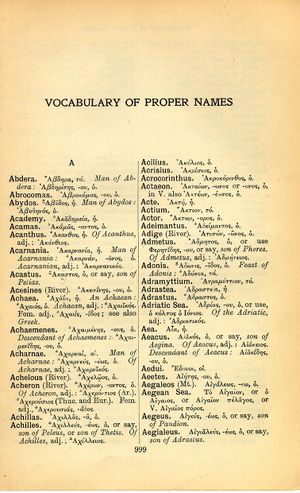Acheron
Ἔπαινον ἕξεις, ἂν κρατῇς, ὧν δεῖ κρατεῖν → Laus est, si, quibus est imperandum, tu imperes → Lob hast du, wenn du herrschst, worüber zu herrschen gilt
English > Greek (Woodhouse)
(River) Ἀχέρων, -οντος, ὁ.
Of Acheron, adj.: Ἀχερόντιος (Ar.). Ἀχερούσιος (Thuc. and Eur.). Fem. adj., Ἀχερουσιάς, -άδος.
Latin > English (Lewis & Short)
Ăchĕron: ntis (collat. form Acheros, Liv. 8, 24, 11; the form Acheruns, untis, see below), m., = Ἀχέρων (interpr. ὁ ἄχεα ῥέων,
I the stream of woe).
I A river in Epirus, which flows through the Lake Acherusia into the Ambracian Gulf, now Suli, Liv. 8, 24, 3; Plin. 4, 1, 1, § 4.—
II A fabulous river in the Lower World: illi qui fluere apud inferos dicuntur, Acheron, Cocytus, Styx, etc., Cic. N. D. 3, 17: via Tartarei quae fert Acherontis ad undas, Verg. A., 6, 295 al.—Hence,
B The Lower World itself: Acherontem obibo, ubi mortis thesauri objacent, Enn. ap. Fest. p. 201 Müll. (Trag. v. 278 ed. Vahl.): flectere si nequeo Superos, Acheronta movebo, Verg. A. 7, 312: perrupit Acheronta Herculeus labor, Hor. C. 1, 3, 36. In prose: ut eum suo sanguine ab Acheronte, si possent, cuperent redimere, Nep. Dion. 10, 2.—Hence, Ăchĕrontēus, a, um, adj., pertaining to the Acheron, Claud. Rapt. Pros. 2, 351.

